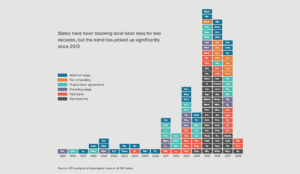Yesterday, Senator Patty Murray (D-WA) and Congressman Bobby Scott (D-VA) reintroduced the Child Care for Working Families Act, which dramatically expand access to high-quality child care to low- and middle-income families. The legislation would cap childcare expenses for all families making up to 150 percent of State Median Income, ensuring that no eligible family pays more than seven percent of their income on childcare. The bill would also provide incentives for states to invest in expanded or universal 3-K and Pre-K programs. Childcare costs have skyrocketed in recent years, putting immense stress on parents’ financial security. Today, the vast majority of families with young kids in states from Georgia to Massachusetts to Minnesota pay 10 percent or more (per child!) of their income on childcare. These burdens are especially harsh on parents earning low wages: in some cities, an averaged-price day-care would cost more than the total wages that a minimum-wage worker would make in a year. A massive federal childcare program — like the Child Care for Working Families Act — would thus alleviate a major barrier to work for parents, especially mothers. The Center for American Progress estimates that the bill would create 2.3 million new jobs by helping parents return to work and significantly expanding child care jobs.
On Tuesday, New York lawmakers introduced legislation to decriminalize sex work across the state, in a victory for the growing movement for sex workers’ rights. In an op-ed for the Daily News, State Senators Jessica Ramos and Julia Salazar write that they introduced the bill because “[c]riminalization exposes people to exploitation” and fails to address the economic and social needs that lead many people to trade sex. Enforcement of New York’s anti-sex-work laws is highly racialized: according to the Red Umbrella Project, a sex workers advocacy group, black women make up an estimated 94% of arrests for loitering for the purposes of prostitution in Brooklyn and Queens. Survival sex is also especially common among LGBTQ youth, especially runaway or homeless youth who turn to sex work because their families refuse to support them. To date, no U.S. state has fully decriminalized sex work.
Activists are fighting to repeal a Colorado statute that preempts local wage increases. The law specifies that the state, rather than cities or counties, have the power to set the minimum wage — despite significant differences in the cost of living across the state. The campaign follows high-profile new local laws to raise the minimum wage, guarantee paid leave, and combat on-call scheduling. Colorado’s preemption statute dates back to 1999, but state legislatures’ use of preemption to vacate local ordinances protecting workers’ rights has markedly increased since 2013, according to the Economic Policy Institute. Colorado’s statewide minimum wage is currently set to rise to $12 by 2020.

The Supreme Court declined to hear an appeal from In-N-Out Burger, Inc., who hoped to argue that it could bar workers from wearing Fight for $15 buttons. Last year, the Fifth Circuit ruled that the burger chain violated the National Labor Relations Act when it told restaurant workers to remove their buttons. In-N-Out argued that its “no pins or stickers” rule was necessary to protect its “public image,” but the NLRB ruled that it was nonetheless a labor law violation to ask workers not to wear buttons about workplace conditions.
Today is the fifth day of the Oakland teacher strike. According to Oakland Unified School District officials, only six percent of students are attending school during the strike. At New York Magazine, Sarah Jones explains how rising inequality forced teachers out of the Bay Area, leading many to strike in the hopes of sharing a “community with the students [they] serve.”






Daily News & Commentary
Start your day with our roundup of the latest labor developments. See all
January 11
Colorado unions revive push for pro-organizing bill, December’s jobs report shows an economic slowdown, and the NLRB begins handing down new decisions
January 9
TPS cancellation litigation updates; NFL appeals Second Circuit decision to SCOTUS; EEOC wins retaliation claim; Mamdani taps seasoned worker advocates to join him.
January 8
Pittsburg Post-Gazette announces closure in response to labor dispute, Texas AFT sues the state on First Amendment grounds, Baltimore approves its first project labor agreement, and the Board formally regains a quorum.
January 7
Wilcox requests en banc review at DC Circuit; 9th Circuit rules that ministry can consider sexual orientation in hiring decisions
January 5
Minor league hockey players strike and win new deal; Hochul endorses no tax on tips; Trump administration drops appeal concerning layoffs.
December 22
Worker-friendly legislation enacted in New York; UW Professor wins free speech case; Trucking company ordered to pay $23 million to Teamsters.